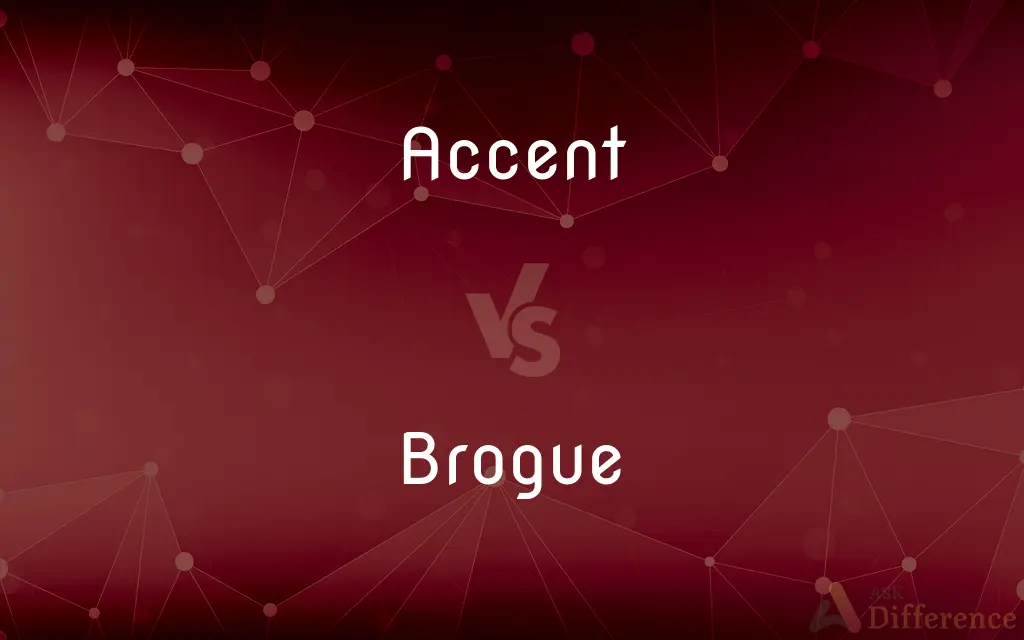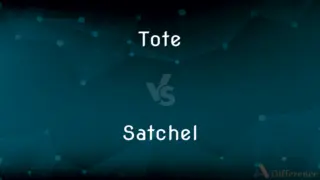Accent vs. Brogue — What's the Difference?
By Tayyaba Rehman & Maham Liaqat — Updated on April 23, 2024
Accent refers to the way words are pronounced based on regional or social influences, while brogue specifically denotes a marked Irish accent, especially in English.

Difference Between Accent and Brogue
Table of Contents
ADVERTISEMENT
Key Differences
An accent encompasses variations in pronunciation that reflect a speaker's regional, social, or ethnic background. While accents can widely differ even within the same language, they are a natural part of spoken languages across the world. In contrast, the term brogue specifically refers to the Irish accent, particularly when speaking English. It is characterized by its distinctive pronunciation and intonation patterns that set it apart from other English accents.
Accents are an inevitable part of learning and speaking any language, influenced by a person’s surroundings and interactions. They can indicate where a person is from or even their social class. On the other hand, a brogue is not just any accent but a specific type associated with Ireland, often recognized by its rhythmic and melodic quality.
While all native and non-native English speakers have some type of accent, not all speak with a brogue. A brogue is distinctly Irish and can vary significantly even within Ireland itself, from the soft, lyrical tones of the southern regions to the sharper sounds of the north.
The study of accents, or sociolinguistics, considers how accents evolve and what they signify about identity and culture. Conversely, discussions about the brogue often focus on its charm and its strong associations with Irish national identity and heritage.
Though accents may sometimes lead to communication barriers or stereotypes, they are a rich aspect of linguistic diversity. Meanwhile, the brogue, with its deep cultural roots, is often celebrated in media and literature, symbolizing Irish pride and identity.
ADVERTISEMENT
Comparison Chart
Definition
Way of pronunciation based on regional influences
Specific type of Irish accent in English
Origin
Varies globally
Ireland
Significance
Indicates regional or social background
Symbol of Irish identity and heritage
Variability
Wide range within and across languages
More localized, specific to Irish regions
Perception
Can influence social or cultural perceptions
Often viewed romantically or with cultural pride
Compare with Definitions
Accent
A way of speaking typical of a particular group of people or region.
She spoke with a thick Southern accent.
Brogue
A feature of pronunciation that marks someone as Irish.
The brogue is often imitated in plays and films for authentic Irish characters.
Accent
A distinctive mode of pronunciation of a language.
His British accent made him stand out in the American crowd.
Brogue
A strong Irish accent, particularly when speaking English.
He spoke English with a pronounced brogue.
Accent
A feature that accentuates the characteristics of something.
The accent colors in the room highlighted its modern aesthetic.
Brogue
A manner of speech that is unique to the Irish.
Her brogue was thick, melodic, and unmistakably Irish.
Accent
The emphasis on a particular syllable or word.
In poetry, the accent often falls on the first syllable.
Brogue
A way of speaking English that is notably influenced by Irish Gaelic.
His brogue had a lyrical quality that held everyone's attention.
Accent
A mark used to indicate stress or pronunciation.
In Spanish, an accent mark can change the word's meaning.
Brogue
An accent characteristic of Ireland.
Tourists often find the Irish brogue charming and unique.
Accent
The relative prominence of a particular syllable of a word by greater intensity or by variation or modulation of pitch or tone.
Brogue
A heavy shoe of untanned leather, formerly worn in Scotland and Ireland.
Accent
Vocal prominence or emphasis given to a particular syllable, word, or phrase.
Brogue
A strong oxford shoe, usually with ornamental perforations or wingtips.
Accent
One determined by the regional or social background of the speaker.
Brogue
A strong dialectal accent, especially a strong Irish or Scottish accent when speaking English.
Accent
One determined by the phonetic characteristics of the speaker's native language carried over to that speaker's use of another language.
Brogue
A strong dialectal accent. In Ireland it used to be a term for Irish spoken with a strong English accent, but gradually changed to mean English spoken with a strong Irish accent as English control of Ireland gradually increased and Irish waned as the standard language.
Accent
A mark or symbol used in the printing and writing of certain languages to indicate the vocal quality to be given to a particular letter
An acute accent.
Brogue
A strong Oxford shoe, with ornamental perforations and wing tips.
Accent
A mark or symbol used in printing and writing to indicate the stressed syllables of a spoken word.
Brogue
(dated) A heavy shoe of untanned leather.
Accent
Rhythmically significant stress in a line of verse.
Brogue
To speak with a brogue (accent).
Accent
Emphasis or prominence given to a note or chord, as by an increase in volume or extended duration.
Brogue
(intransitive) To walk.
Accent
A mark representing this.
Brogue
(transitive) To kick.
Accent
A mark used as a superscript to distinguish among variables represented by the same symbol.
Brogue
(transitive) To punch a hole in, as with an awl.
Accent
A mark used as a superscript to indicate the first derivative of a variable.
Brogue
(dialect) to fish for eels by disturbing the waters.
Accent
A mark or one of several marks used as a superscript to indicate a unit, such as feet (′) and inches (") in linear measurement.
Brogue
A stout, coarse shoe; a brogan.
Accent
A distinctive feature or quality, such as a feature that accentuates, contrasts with, or complements a decorative style.
Brogue
A dialectic pronunciation; esp. the Irish manner of pronouncing English.
Or take, Hibernis, thy still ranker brogue.
Accent
Something that accentuates or contrasts something else, as a touch of color that makes the features of an image stand out.
Brogue
A thick and heavy shoe
Accent
Particular importance or interest; emphasis
The accent is on comfort.
Accent
To stress or emphasize the pronunciation of
Accented the first syllable in “debacle.”.
Accent
To mark with a printed accent.
Accent
To focus attention on; accentuate
A program that accents leadership development.
Accent
(linguistics) A higher-pitched or stronger (louder or longer) articulation of a particular syllable of a word or phrase in order to distinguish it from the others or to emphasize it.
In the word "careful", the accent is placed on the first syllable.
Accent
(figuratively) Emphasis or importance in general.
At this hotel, the accent is on luxury.
Accent
(orthography) A mark or character used in writing, in order to indicate the place of the spoken accent, or to indicate the nature or quality of the vowel marked.
The name Cézanne is written with an acute accent.
Accent
Modulation of the voice in speaking; the manner of speaking or pronouncing; a peculiar or characteristic modification of the voice, expressing emotion; tone.
Accent
The distinctive manner of pronouncing a language associated with a particular region, social group, etc., whether of a native speaker or a foreign speaker; the phonetic and phonological aspects of a dialect.
A foreign accent
A broad Irish accent
A hint of a German accent
Accent
A manner of pronunciation suggesting that the speaker is from a different region; a foreign accent.
My professor's accent is so thick that it's difficult to understand her lectures.
She spoke with a strong accent that betrayed her southern roots.
I was surprised to learn that he was an immigrant, as he spoke without any accent.
Accent
(sign languages) A distinctive manner of producing a sign language, such as someone who does not normally use a certain sign language might have when using it.
Accent
A word; a significant tone or sound.
Accent
Expressions in general; speech.
Accent
Stress laid on certain syllables of a verse.
Accent
(music) A regularly recurring stress upon the tone to mark the beginning, and, more feebly, the third part of the measure.
Accent
(music) A special emphasis of a tone, even in the weaker part of the measure.
Accent
(music) A mark used to represent this special emphasis.The third and fourth symbols are accents (marks used to represent special emphasis in music).
Accent
(music) The rhythmical accent, which marks phrases and sections of a period.
Accent
(mathematics) A prime symbol.
Accent
Emphasis laid on a part of an artistic design or composition; an emphasized detail, in particular a detail in sharp contrast to its surroundings.
Accent color
Accent
A very small gemstone set into a piece of jewellery.
Accent
(archaic) Utterance.
Accent
(transitive) To express the accent of vocally; to utter with accent.
Accent
(transitive) To mark emphatically; to emphasize; to accentuate; to make prominent.
Accent
(transitive) To mark with written accents.
Accent
A superior force of voice or of articulative effort upon some particular syllable of a word or a phrase, distinguishing it from the others.
Accent
A mark or character used in writing, and serving to regulate the pronunciation; esp.: (a) a mark to indicate the nature and place of the spoken accent; (b) a mark to indicate the quality of sound of the vowel marked; as, the French accents.
Accent
Modulation of the voice in speaking; manner of speaking or pronouncing; peculiar or characteristic modification of the voice; tone; as, a foreign accent; a French or a German accent.
The tender accent of a woman's cry.
Accent
A word; a significant tone
Winds! on your wings to Heaven her accents bear,Such words as Heaven alone is fit to hear.
Accent
Stress laid on certain syllables of a verse.
Accent
A regularly recurring stress upon the tone to mark the beginning, and, more feebly, the third part of the measure.
Accent
A mark placed at the right hand of a letter, and a little above it, to distinguish magnitudes of a similar kind expressed by the same letter, but differing in value, as y´, y.
Accent
To express the accent of (either by the voice or by a mark); to utter or to mark with accent.
Accent
To mark emphatically; to emphasize.
Accent
Distinctive manner of oral expression;
He couldn't suppress his contemptuous accent
She had a very clear speech pattern
Accent
Special importance or significance;
The red light gave the central figure increased emphasis
The room was decorated in shades of gray with distinctive red accents
Accent
The usage or vocabulary that is characteristic of a specific group of people;
The immigrants spoke an odd dialect of English
He has a strong German accent
Accent
The relative prominence of a syllable or musical note (especially with regard to stress or pitch);
He put the stress on the wrong syllable
Accent
A diacritical mark used to indicate stress or placed above a vowel to indicate a special pronunciation
Accent
To stress, single out as important;
Dr. Jones emphasizes exercise in addition to a change in diet
Accent
Put stress on; utter with an accent;
In Farsi, you accent the last syllable of each word
Common Curiosities
Can anyone have a brogue?
Typically, a brogue is specific to people from Ireland or those who have learned the accent through deep cultural immersion.
What is a brogue?
A brogue is a specific type of accent notable for its association with the Irish people and their way of speaking English.
Why do accents exist?
Accents develop due to geographical, social, and historical influences among speakers of the same language.
Does having a brogue affect understanding?
For some listeners, especially non-natives, a thick brogue can sometimes pose comprehension challenges.
Are accents inherited or learned?
Accents are learned based on one's environment and social interactions during language acquisition.
What are some common features of a brogue?
Common features include specific vowel and consonant pronunciations that differ from General American or Received Pronunciation English.
Can accents lead to social bias?
Unfortunately, accents can sometimes lead to prejudices or stereotypes in social and professional settings.
How can one reduce their accent or brogue?
Accent reduction can be pursued through specific speech therapy or training programs focusing on pronunciation.
What is an accent?
An accent is the manner in which people pronounce words, often shaped by regional or social factors.
Is an accent different from a dialect?
Yes, an accent pertains only to pronunciation, while a dialect includes grammatical, lexical, and pronunciation differences.
What makes the brogue distinct from other accents?
The brogue is particularly melodic and rhythmic, making it distinctive among various English accents.
Can a person's accent change?
Yes, a person's accent can change over time due to relocation, professional influence, or personal choice.
Is there a stigma associated with having a brogue?
While generally viewed positively, in some contexts, any strong accent, including a brogue, might be misunderstood or stereotyped.
How are accents helpful?
Accents can serve as cultural identifiers and add to the richness of linguistic diversity.
What role does a brogue play in Irish culture?
The brogue is a proud emblem of Irish heritage and is often celebrated in literature and media.
Share Your Discovery

Previous Comparison
Tote vs. Satchel
Next Comparison
Interstate vs. FreewayAuthor Spotlight
Written by
Tayyaba RehmanTayyaba Rehman is a distinguished writer, currently serving as a primary contributor to askdifference.com. As a researcher in semantics and etymology, Tayyaba's passion for the complexity of languages and their distinctions has found a perfect home on the platform. Tayyaba delves into the intricacies of language, distinguishing between commonly confused words and phrases, thereby providing clarity for readers worldwide.
Co-written by
Maham Liaqat













































